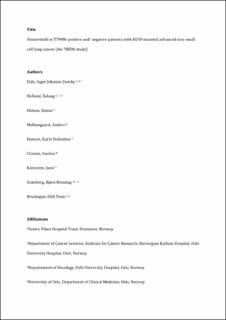| dc.description.abstract | Objectives
In non-small cell lung cancer patients with acquired resistance to first- or second-generation EGFR-TKIs, osimertinib is approved in the presence of the T790 M resistance mutation. We assessed the efficacy of osimertinib in both T790M-positive and T790M-negative patients.
Materials and methods
The TREM-study is an investigator-initiated, multi-centre, single-arm, phase 2 clinical trial conducted in five Northern European countries. Patients with progression on at least one previous EGFR-TKI were assigned to treatment with 80 mg of osimertinib daily until radiological progression or death. Patients were included regardless of the presence of T790 M. The primary endpoint was objective response rate (ORR).
Results
Of 199 included patients, 120 (60 %) were T790M-positive, 52 (26 %) were T790M-negative and 27 (14 %) had unknown T790M-status. 24 % had brain metastases and 15 % had an ECOG performance status of 2. Overall ORR was 48 % (95 % CI, 41 %–55 %), 60 % (51 %–69 %) for T790M-positive patients and 28 % (15 %–41 %) for T790M-negative patients, p < 0.001. ORR for patients with co-occurring del19 vs L858R was 61 % vs 32 %, p = 0.001. Duration of response was similar between the T790M-positive and –negative groups (11.8 vs 10.7 months, p = 0.229). Overall median progression-free survival (PFS) was 8.9 months (95 % CI, 7.4–10.5), and 10.8 vs 5.1 months for T790M-positive vs –negative patients (HR 0.62, p = 0.007). Median overall survival (OS) was 17.9 months (95 % CI, 14.4–21.3). For T790M-positive vs –negative median OS was 22.5 vs 13.4 months, (HR 0.55, p = 0.002).
Conclusions
This study confirms the efficacy of osimertinib for T790M-positive patients. There was also clinically significant activity of osimertinib in a proportion of T790M-negative patients. | en_US |

